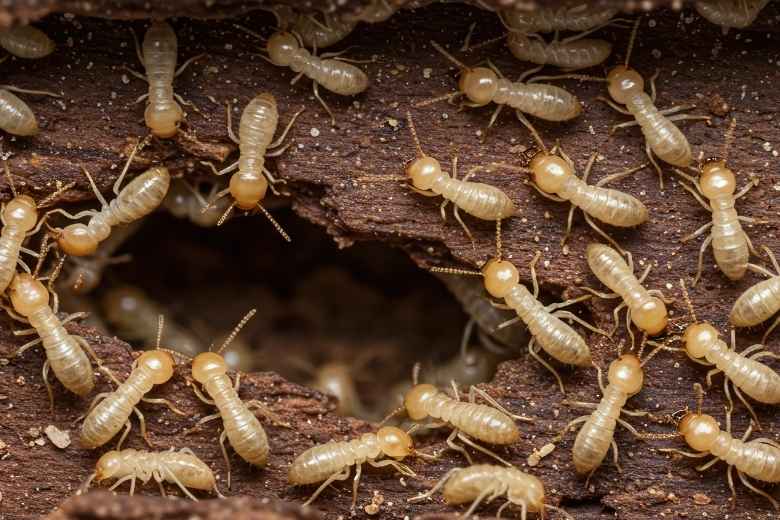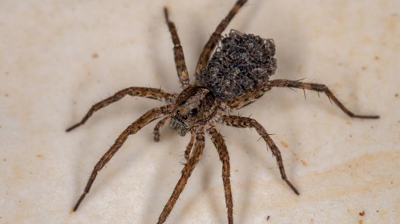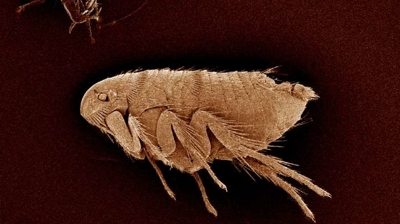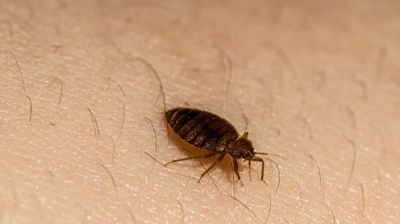
Termites

Are Termites Harmful?
Termites are considered harmful for various reasons, primarily due to their destructive behavior. Here are some of the ways termites are harmful:
- Structural Damage: Termites are well-known for their ability to consume and damage wooden structures, including homes, buildings, furniture, and wooden fixtures. They can weaken the structural integrity of these items, leading to costly repairs or even structural failure in severe cases.
- Economic Impact: Termite infestations can have a significant economic impact. The costs associated with termite damage and repair can be substantial for homeowners, businesses, and the construction industry.
- Fire Hazard: As termites chew through wooden structures, they create tunnels and voids. In the case of electrical wiring or other systems within walls, this can increase the risk of electrical faults and fire hazards.
- Reduced Property Value: A history of termite infestation can lower the value of a property. Prospective buyers may be hesitant to invest in a property with a known or previous termite problem.
- Health Concerns: While termites are generally not direct health hazards to humans, their presence and activities can create an environment that promotes mold growth. Mold can lead to health issues, especially for individuals with respiratory conditions or allergies.
- Property Aesthetics: Termite damage can significantly affect the appearance of wooden structures, which can reduce the overall aesthetics of a property.
Due to their secretive nature and ability to work quietly over extended periods, termites can cause extensive damage before their presence is even noticed. For these reasons, it is crucial to take proactive steps to prevent and control termite infestations, such as regular inspections and professional pest management, to mitigate the harmful effects of these pests.
Learn more: Do Termites Bite? || What Do Termites Look Like? || What Do Termite Droppings Look Like?
Termite Inspections
Having your home or business inspected for termites is critical because termites are stealthy, destructive pests that can compromise the structural integrity of buildings long before their presence is noticeable. Here’s why our termite inspections are so important:
- Early Detection Prevents Extensive Damage: Termites feed on cellulose found in wood, paper, and other building materials. They often go undetected until significant damage has occurred. Our professional inspections can identify early signs of infestation—like mud tubes, hollow-sounding wood, or discarded wings—before structural damage becomes severe and costly to repair.
- Protects Your Investment: Homes and commercial properties represent substantial financial investments. Undetected termite infestations can cause costly structural repairs, lower property value, and complicate insurance claims. Our regular inspections help protect that investment by addressing problems early.
- Health and Safety Considerations: While termites do not transmit diseases to humans, they weaken structural elements such as beams, floors, and walls. This can create safety hazards like sagging floors, collapsing ceilings, or weakened load-bearing structures.
- Saves Money Long-Term: The cost of preventative termite control and early treatment is far lower than repairing severe damage after an infestation has spread. Inspections allow you to implement targeted treatments before termites cause expensive structural issues.
- Necessary for Real Estate Transactions: If you are buying, selling, or refinancing a property, many lenders and real estate contracts require a termite inspection. Our documented inspections ensure the property meets required standards and can avoid legal or financial complications.
- Tailored Treatment Plans: Our professional inspectors can determine the species of termite, the extent of infestation, and the areas at highest risk. This allows for a customized treatment plan, whether it’s baiting systems, liquid treatments, or soil barriers, ensuring maximum effectiveness.
- Peace of Mind: Even if termites aren’t currently present, inspections provide assurance that your property is protected and help establish a schedule for regular monitoring, reducing the risk of future infestations.
Termite inspections are a proactive, cost-effective measure to protect the structural integrity, financial value, and safety of your property. For homes and businesses, regular inspections are a cornerstone of responsible property management.
Termite Removal
Getting rid of termites is critical because they are among the most destructive pests for homes and buildings. Here’s why addressing termite infestations is so important:
- Structural Damage: Termites feed on cellulose, which is found in wood, paper, and other building materials. Over time, even a small infestation can compromise the structural integrity of walls, floors, beams, and foundations. Damage is often hidden until it becomes severe, making early control essential.
- Financial Cost: Repairing termite damage can be extremely expensive. Homeowners may face thousands of dollars in repairs, especially if infestations go undetected for years. Preventing or treating infestations early is far cheaper than repairing extensive structural damage.
- Property Value: Homes with a history of termite damage or ongoing infestations can lose value and become harder to sell. Prospective buyers are often wary of purchasing properties with termite issues.
- Health Concerns: While termites themselves are not known to transmit disease, their activity can lead to mold growth when they damage wooden structures and support beams. Mold can pose respiratory risks and worsen indoor air quality.
- Rapid Reproduction: Termites reproduce quickly, and colonies can grow to hundreds of thousands of insects. This rapid growth makes infestations difficult to control once established, increasing the urgency of professional intervention.
- Hidden Infestations: Termites often remain out of sight, working inside walls or underground. Many homeowners do not notice the problem until significant damage has already occurred, which is why routine inspections and early treatment are vital.
- Prevention of Further Spread: If left unchecked, termites can move from one property to another, affecting neighbors’ homes or nearby structures. Controlling them promptly helps prevent broader infestations in your area.
Ignoring termites can result in serious financial loss, structural hazards, and long-term headaches. Our professional termite control not only eliminates existing colonies but also protects your property from future damage.
Learn more: How To Get Rid Of Termites || How To Get Rid Of Flying Termites
Termite Control
Our professional termite control is one of the most important pest services a homeowner or business owner can invest in because termites are incredibly destructive, often working silently behind walls, under floors, and in structural supports until the damage becomes extensive and costly. Here are some of the reasons why professional termite control is essential:
- Protection Against Severe Structural Damage: Termites feed on wood, paper, and other cellulose materials. If left untreated, they can compromise the structural integrity of your home or business, weakening beams, flooring, and even foundation supports. Our professional treatment helps stop colonies before the damage reaches dangerous levels.
- Early Detection and Expert Inspection: Our professionals know how to spot subtle signs of termite activity that most people would miss—such as discarded wings, mud tubes, or hollow-sounding wood. Early detection is critical because it reduces both repair costs and the scale of treatment required.
- Effective, Long-Lasting Treatment Solutions: DIY sprays or store-bought products are often ineffective against large colonies. Our professionals use advanced solutions like liquid barrier treatments, baiting systems, and monitoring stations designed to eliminate termites at the source and provide ongoing protection.
- Customized Plans for Your Property: Every property is different. Our pest control experts assess your specific risks—such as soil conditions, construction type, and surrounding environment—to create a tailored plan that protects your home or business long-term.
- Preventative Protection: Even if you don’t currently see termites, our professional termite control includes preventative measures. Our professionals can set up monitoring and protection systems that stop future infestations before they start.
- Cost Savings in the Long Run: The cost of our professional termite services is minimal compared to the thousands—or even tens of thousands—of dollars in repairs needed for untreated termite damage. Insurance typically doesn’t cover termite destruction, making our professional control a wise financial safeguard.
- Peace of Mind: Knowing your largest investment—your home or commercial property—is protected from one of the most destructive pests gives you confidence and reassurance.
Termites are small, soft-bodied insects. Despite their size, termites are among the most destructive structural pests in the world due to their ability to consume and digest cellulose, the main component of wood. Termites are commonly referred to as "silent destroyers" because they can secretly cause significant damage to buildings, wooden structures, and furniture without any immediate visible signs.
Termite Exterminators
Hiring our local exterminators for termite control comes with several specific advantages that go beyond general pest removal. Termites are particularly insidious pests, and our local expertise makes a significant difference in both effectiveness and long-term protection:
- Knowledge of Local Termite Species and Behavior: Different termite species have different habits, nesting locations, and activity patterns. Our local exterminators are familiar with the species common in the area (typically subterranean termites in Washington DC, Maryland, and Northern Virginia) and understand their seasonal behavior. This knowledge allows us to target infestations more accurately, rather than relying on a generic treatment approach.
- Customized Treatment Plans: Termite infestations vary by property type, construction materials, and soil conditions. Our local exterminators evaluate your home or business and develop a treatment plan that accounts for local environmental factors. This ensures that our treatments penetrate the areas where termites are most likely to thrive, such as wooden structures, crawl spaces, or foundation soil.
- Faster Response Times: Our local technicians can typically respond quickly to inspections and emergencies. Termites can cause significant damage, so rapid intervention reduces the risk of structural damage and limits costly repairs.
- Compliance with Local Regulations: Termite treatments often involve chemicals or baiting systems regulated at the state or county level. Our local exterminators are familiar with these regulations, ensuring treatments are legal, safe, and properly documented. This is especially important for commercial properties, real estate transactions, or insurance claims.
- Long-Term Monitoring and Prevention: Our local exterminators provide ongoing monitoring tailored to regional termite activity. We provide termite baiting systems and periodic inspections that detect early signs of infestation. This preventive approach is particularly valuable in areas with high termite populations.
- Expertise with Local Construction and Landscaping: Termites exploit specific vulnerabilities in buildings and surrounding areas, such as wooden decks, mulch, or irrigation systems. Our local exterminators understand the common construction types and landscaping practices in the area, allowing them to identify and address high-risk zones effectively.
- Community Reputation and Accountability: Hiring our local exterminators provides accountability and reliability. Our local team relies on our reputation within the community, so we are more invested in delivering thorough, professional service. We are easier to contact for follow-up visits or ongoing support.
Our local exterminators offer targeted expertise, rapid response, and ongoing protection tailored to your property’s location and the termites most likely to threaten it. For serious pests like termites, this local knowledge can save tens of thousands in repairs while ensuring a long-term solution.
Termite Solutions
Our exterminators use Integrated Pest Management (IPM) to control termites because these insects can cause severe structural damage to homes, buildings, and wooden structures, often going undetected until significant destruction has occurred. IPM begins with a thorough inspection to identify termite activity, infestation sites, and environmental factors that attract them, such as moisture, wood-to-soil contact, and decaying organic matter. Management strategies focus on habitat modification by eliminating moisture problems, removing wood debris, improving ventilation, and creating physical barriers to prevent termite access. Physical and mechanical controls, including baiting systems and monitoring stations, are employed to detect and reduce termite populations, while chemical treatments are applied selectively to infested areas or as preventive barriers. Ongoing monitoring ensures early detection of new activity, evaluates the effectiveness of treatments, and prevents reinfestation. By integrating inspection, habitat management, selective interventions, and monitoring, IPM provides a long-term, environmentally responsible, and effective approach to managing termite populations and protecting structures from extensive damage.
Where Are Termites Found?
Termites can be found in various locations, primarily in areas where they can access a source of cellulose, which is their main food. They are more common in certain geographic regions and can be found in different environments. Here's where you might find termites:
- Geographic Distribution: Termites are more prevalent in warmer, humid climates, such as the southern United States, Southeast Asia, Africa, and South America. However, they can be found in almost every part of the world, with different species adapted to various environments.
- In and Around Homes: Termites often infest homes and buildings. Termites feed on wood, so they are commonly found in wooden beams, joists, and furniture. They can enter homes through the foundation and infest structural wood components. Termites may establish colonies in attics and crawl spaces. Termites are attracted to moisture, so they can be found near leaky pipes, drains, or damp areas.
- Gardens and Landscapes: Termites can infest dead or decaying wood, including tree stumps, mulch, and fallen branches in your yard.
- Tree Nests: Some termite species build nests on trees, especially in tropical and subtropical regions. These nests are often referred to as epigeal nests.
- Subterranean Nests: Many termite species, including subterranean termites, build nests underground. They construct mud tunnels or tubes that extend from the ground to their food source, which can be hidden from view.
- Wooden Fences and Decks: Termites can infest wooden fences, decks, and other outdoor wooden structures.
- Wooden Furniture: Termites can damage wooden furniture, especially if it has been exposed to moisture or is in a damp environment.
- Firewood: Stacked firewood near your home can attract termites, providing a bridge for them to enter your structure.
- Old Trees and Dead Wood: In forests and natural areas, termites play a crucial role in breaking down dead and decaying wood. You may find them in such environments, contributing to ecological processes.
To identify a termite infestation, look for signs such as mud tubes, damaged wood, swarming termites, and discarded wings. If you suspect you have a termite problem, contact our team of professional termite control experts for a termite inspection and appropriate treatment, as termites can cause significant damage to structures.
Learn more: What Causes Termites? || Does Mulch Attract Termites? || Where Do Termites Come From? || Flying Termites In Your House?
Termite Life Cycle
The life cycle of termites involves several distinct castes within a colony and includes stages such as egg, nymph, and adult. The life cycle of termites is characterized by a process known as metamorphosis, which includes several molts and castes. Here's the life cycle of termites:
- Egg Stage: The termite life cycle begins with the egg. The queen termite, which is the colony's reproductive female, lays eggs in a secure chamber within the nest. The eggs are cared for by worker termites and hatch into nymphs.
- Nymph Stage: After hatching, the young termites are referred to as nymphs. Nymphs resemble smaller versions of adult termites but are not yet fully developed. They go through a series of molts, shedding their exoskeletons as they grow. Nymphs are responsible for various tasks within the colony, including caring for eggs and young, foraging for food, and maintaining the nest.
- Caste Differentiation: As nymphs continue to develop, they may eventually become specialized into different castes, depending on the needs of the colony. The primary castes in a termite colony include workers, soldiers, and reproductives (swarmers). Workers are the most numerous termites in the colony and are responsible for tasks like foraging, feeding, and nest maintenance. Soldiers are specialized for defense, and they have larger heads and mandibles to protect the colony from threats. Some nymphs develop into alates, or swarmers, which are the winged reproductive termites. These termites leave the colony during a swarm to start new colonies. Once they find a suitable mate, they shed their wings and become the king and queen of a new colony.
- Queen and King: Once a pair of alates has mated, they become the primary reproductives of a new colony. The queen's sole purpose is to lay eggs, and she can produce thousands of eggs each day. The king's role is to fertilize the queen and assist in colony maintenance.
- Colony Expansion: Over time, the colony continues to grow as the queen lays more eggs, and the workers and soldiers maintain the nest, forage for food, and defend against threats. The colony may produce additional swarmers to create new colonies.
The termite life cycle is highly organized, with each caste performing specific roles to ensure the survival and growth of the colony. Understanding this life cycle is crucial for effective pest control and management, as it allows professionals to target the specific castes responsible for the colony's survival. Termites can be highly destructive pests, causing damage to wooden structures, making it essential to address infestations promptly.
Types of Termites

Hear From Our Happy Customers
-
"Fantastic & Patient"
Jarvis was fantastic and patient. He answered my questions with an in-depth explanation and addressed all of my areas of concern. Would love for him to be my assigned tech going forward. Well done!
- Yonnette M. -
"Professional & Considerate"
I’m pleased with Miche services. Jarvis came today. Professional and considerate. Thank you!
- Judy B. -
"Exceeds Expectations"
I can’t say enough positive things about this company... The tech that came out, Jarvis went above and beyond my expectations. Thank you guys, I will continue using your services.
- Jake M. -
"Very Knowledgeable"
The tech that arrived was courteous, professional, and very knowledgeable. He was Great.
- Uerial I. -
"Wonderful Service"
Wonderful service. Jarvis is great. Took care of everything I needed. Thank you!
- Henry P. -
"Great Communication"
Tech was on time, communication was great, and he accommodated my needs.
- Alonzo W.



